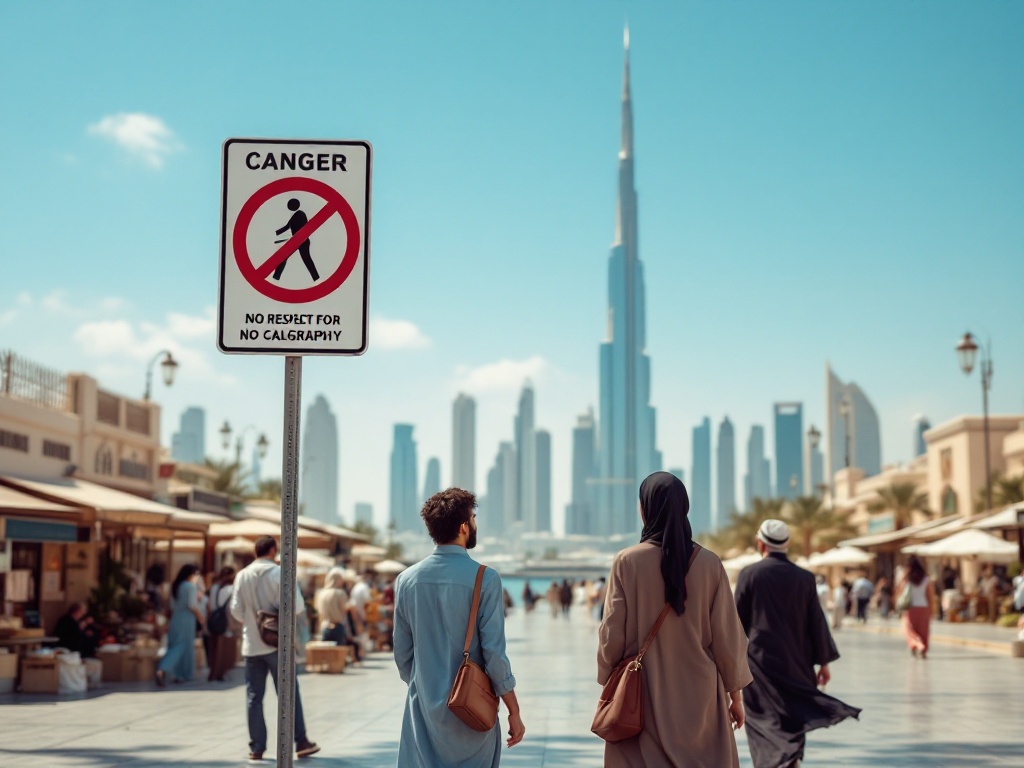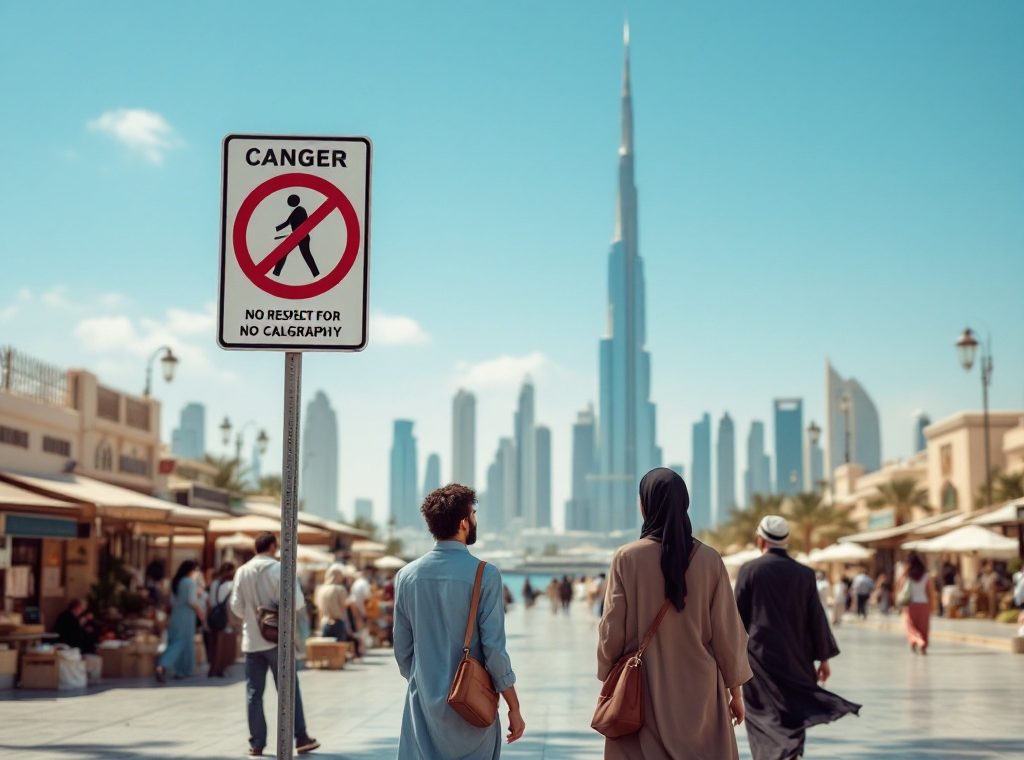Top Dubai Laws for Tourists: What’s Legal and What’s Not
Planning a dream Dubai vacation? Don’t let legal troubles ruin it. Dubai’s strict laws on dress, public affection, alcohol, and even social media can catch tourists off guard. From modest dress codes to zero-tolerance drug policies, this guide covers essential information to ensure a smooth, worry-free trip. Learn how to respect local customs, avoid hefty fines or imprisonment, and experience Dubai without legal hiccups. Read on to prepare for a safe and enjoyable journey!
Important information

- Dress modestly, covering shoulders and knees in public. More conservative attire is expected at religious sites.
- Public displays of affection are discouraged, and same-sex relationships are illegal.
- Alcohol is permitted only in licensed venues. Public intoxication and drunk driving carry severe penalties.
- Dubai has a zero-tolerance drug policy, including for some prescription medications. Verify legality before traveling.
- Photography of government buildings, military installations, and people (especially Emirati women) without permission is prohibited.
Understanding Dubai’s Strict Laws for Tourists
Planning a trip to Dubai? Be aware of the strict local laws to ensure a hassle-free vacation.
Dress Code
Modest dress is essential, covering shoulders and knees.
Public Display of Affection
Public displays of affection are discouraged.
Alcohol Consumption
Alcohol consumption is permitted only in licensed venues.
Drug Policy
Dubai has a zero-tolerance drug policy, including certain prescription medications. Check their legality beforehand.
Photography Restrictions
Photography of government buildings and other sensitive locations is prohibited.
Respectful Conduct
Refrain from disrespectful remarks about Islam or the government, as these can have serious repercussions.
Respecting local customs will contribute to a pleasant and trouble-free stay.
Dress Code: Modesty and Appropriateness
When in Dubai, dressing respectfully is essential, especially in public spaces. For women, this involves covering their shoulders and knees and avoiding overly revealing clothing. Men should wear shirts with sleeves, and shorts are generally inappropriate in public. When visiting religious sites, more conservative attire is a sign of respect for local customs.
Modest Dress Requirements for Tourists
When visiting Dubai, tourists are advised to dress respectfully. This typically involves covering shoulders and knees, and avoiding overly revealing clothing in public areas like shopping malls. Certain venues may enforce specific dress codes, so it’s recommended to check beforehand. At religious sites, women might consider bringing a headscarf, and men should wear shirts.
Appropriate Clothing Guidelines for Public Spaces
When in Dubai, dress respectfully by covering your shoulders and knees. This shows respect for local customs. Beachwear is acceptable at beaches and pools.
Public Behavior and Decency Laws
When visiting Dubai, remember that public displays of affection are discouraged. Swearing, obscene gestures, and loud music are strictly prohibited and can lead to fines or imprisonment. Respectful behavior and modest dress are essential.
Avoiding Public Displays of Affection
Public displays of affection are discouraged in Dubai and can lead to arrests. While briefly holding hands may be acceptable for married couples, physical contact is generally considered inappropriate. Respecting local customs by avoiding public displays of affection will help you avoid legal issues. Keep physical intimacy private.
Prohibition of Swearing and Vulgar Language
Be mindful of your language, as using offensive language in Dubai is illegal and can lead to fines or imprisonment.
Loud Music Prohibition in Public Areas
Dubai prohibits loud music in public areas to maintain a peaceful environment and respect local customs. Tourists should be mindful of this, especially during Ramadan, to ensure a respectful and peaceful visit.
Alcohol Consumption and Smoking Regulations
In Dubai, alcoholic beverages are permitted only within licensed venues such as hotels, bars, and clubs. Public intoxication is illegal and can lead to serious consequences.
Smoking is similarly restricted, generally prohibited in public areas. Never drink and drive, as it’s against the law and carries severe penalties.
Rules for Alcohol Consumption and Possession
Enjoy alcoholic beverages responsibly at licensed establishments, such as hotels, restaurants, and clubs. Public intoxication is illegal, and driving under the influence carries severe penalties. Be respectful of surrounding areas when leaving these venues.
Smoking Restrictions in Public Places
Smoking regulations in this region are comprehensive. Indoor smoking is entirely prohibited, encompassing public areas like malls, restaurants, and offices. Outdoor smoking also faces restrictions, especially in parks and beaches, though designated smoking zones might exist in certain spots. Additionally, smoking is banned in public places during daylight hours throughout Ramadan.
Driving Under the Influence: Legal Repercussions
Driving under the influence of alcohol is strictly prohibited in Dubai and is rigorously enforced by law enforcement. Penalties for drunk driving can include imprisonment and substantial fines. Therefore, it is crucial to prioritize safety and never drink and drive.
Drug Laws and Severe Penalties
Dubai’s Drug Policy
Dubai enforces a strict zero-tolerance drug policy covering possession, use, and sale. Penalties for drug offenses are severe, including lengthy prison sentences, substantial fines, and even the death penalty for trafficking. Tourists must avoid any drug-related activity in the UAE.
Prescription Medications
Even prescription drugs can be subject to restrictions in Dubai. Before traveling, verify the legality of your medications. Unapproved drugs can lead to penalties, even if legal in your home country. You may need documentation or prior approval from UAE authorities for certain medications, such as painkillers or anxiety medication. Contact the UAE embassy or consulate for clarification.
Drug Use and Possession: Zero-Tolerance Policy
Traveling to Dubai? Be aware of their strict zero-tolerance drug policy. This includes illegal narcotics and some prescription medications. Penalties for violations can be severe, including imprisonment. Thoroughly research the laws and regulations regarding medications before your trip to avoid any potential issues.
Prescription Drugs and Legal Considerations
Traveling to the UAE with prescription medications? Ensure a smooth trip by understanding the regulations. Some common medications are restricted in the UAE. Carry a notarized and attested doctor’s prescription clearly stating the drug’s name, dosage, and your medical condition. Before your trip, confirm that your medications are permitted in the UAE by checking the UAE Ministry of Health’s website. Bringing prohibited substances can result in detention and legal penalties.
Obtain a notarized and attested doctor’s prescription. It must specify the drug’s name, dosage, and your medical condition.
Verify that your medications are permitted in the UAE. Consult the UAE Ministry of Health’s website for a list of restricted and prohibited medications.
Be aware of the potential consequences. Bringing prohibited substances into the UAE can lead to detention and legal penalties.
Photography and Media Restrictions
Be mindful of photography restrictions. Avoid taking photos of military installations, government buildings, and critical infrastructure. Always seek permission before photographing individuals, especially Emirati women and children.
Refrain from online criticism. Criticizing the UAE government online is against the law and can lead to serious consequences. Respect local laws and regulations during your stay.
Permitted and Prohibited Photography Subjects
Photography of the following is prohibited: military installations, government buildings, and critical infrastructure. Avoid taking pictures of these sensitive locations.
Photographing individuals, particularly Emirati women, without their explicit consent is restricted. Always obtain permission before capturing anyone’s image.
Social Media Conduct and Legal Consequences
Sharing content online in the UAE requires caution. Several topics can have legal consequences if discussed disrespectfully. These include: religion, local customs, the government, and its officials. Negative commentary on the UAE or its leaders could result in fines or imprisonment. Additionally, sharing private information or images without permission is a cybercrime, punishable by law. Consider the implications before posting.
Legal Issues Related to Religion and Cultural Sensitivity
Respecting religious and cultural norms in Pakistan is crucial, especially concerning Islam. Disrespecting Islam is illegal and carries severe penalties. Be mindful of religious practices and cultural norms, particularly during Ramadan, to avoid legal issues. Tourists should be aware of and respect local customs related to religious practices and traditions year-round. For example, refraining from eating or drinking publicly during daylight hours in Ramadan demonstrates respect.
Blasphemy and Respect for Religion
Disrespecting Islam is a serious offense in Dubai, punishable by law. Blasphemy, whether through actions or words, can have legal consequences. Therefore, exercise caution and respect.
Cultural Sensitivity During Religious Observances
During Ramadan, please be mindful of those who are fasting. Refrain from eating, drinking, and chewing gum in public during daylight hours. This gesture of respect is greatly appreciated.
Respecting Cultural Norms During Ramadan
Respecting Local Customs During Ramadan in DubaiWhen visiting Dubai during Ramadan, tourists should honor local customs. Refrain from eating, drinking, and smoking in public during daylight hours. This shows cultural sensitivity and helps avoid legal issues. Be mindful that many restaurants operate on reduced hours, and playing loud music in public is prohibited. Following these guidelines ensures a pleasant and respectful visit.
Key Reminders for Tourists During Ramadan in Dubai
- Avoid eating, drinking, or smoking in public places during daylight hours.
- Be aware of reduced operating hours for many restaurants.
- Refrain from playing loud music in public.
Why Respecting Local Customs Matters
Demonstrating cultural sensitivity through adherence to these guidelines not only ensures a smooth and respectful visit but also helps prevent potential legal issues. It contributes to a positive experience for both visitors and residents.
LGBTQ+ Travel Considerations
In Dubai, same-sex intimacy, including public displays of affection, is illegal and can lead to serious legal repercussions. Visitors should be aware of and respect these local laws and customs.
Legal Status of Same-Sex Relations
Same-sex relationships are illegal in Dubai, with severe penalties for sexual activity. Public displays of affection between same-sex couples are also prohibited and can result in legal action. Travelers should exercise caution and be aware of these local laws and customs.
Public Displays of Affection Between Same-Sex Couples
Same-sex relationships are illegal in Dubai, and public displays of affection can lead to arrests. Tourists should exercise caution and refrain from any physical contact, such as holding hands or kissing, in public spaces. These laws are strictly enforced.
Handling Legal Issues and Seeking Legal Help
Understanding Dubai’s legal landscape is essential for a smooth trip. Should any legal issues arise, contacting your embassy or consulate offers immediate support and direction. Hiring a lawyer can also provide crucial legal counsel, clarifying your rights within the UAE. Familiarizing yourself with local laws and procedures is the best way to ensure a safe and informed travel experience. This proactive approach will empower you to navigate potential issues confidently.
Understanding Penalties and Legal Consequences
Violating Dubai’s laws can result in severe penalties, including fines, imprisonment, or deportation. Financial crimes, in particular, may lead to jail time and asset forfeiture. If you encounter legal issues in Dubai, your embassy or consulate can offer vital support and guidance. Don’t hesitate to contact them.
Accessing Emergency Services and Legal Assistance
In Dubai, during emergencies, dial:
- 999 for police assistance,
- 998 for an ambulance,
- 997 for fire emergencies.
For non-emergency situations:
- Contact the police at 901,
- For legal assistance, contact your embassy or consulate for a list of local lawyers and government legal aid options.













